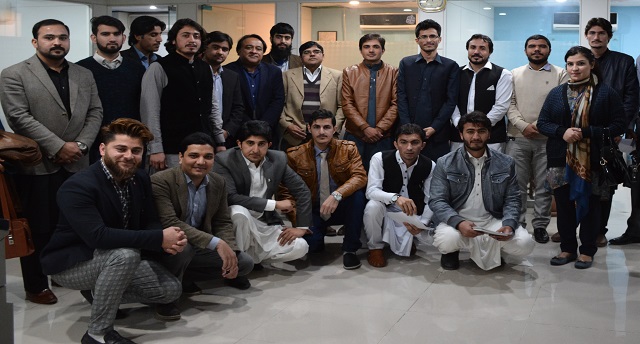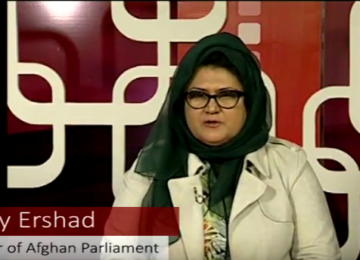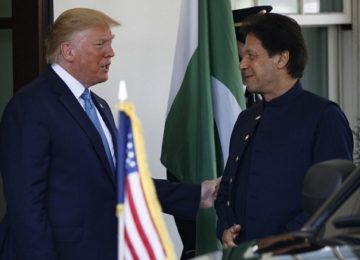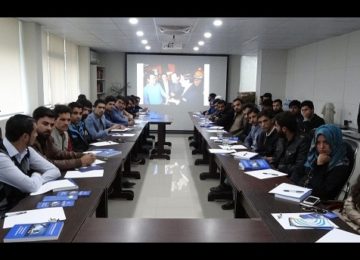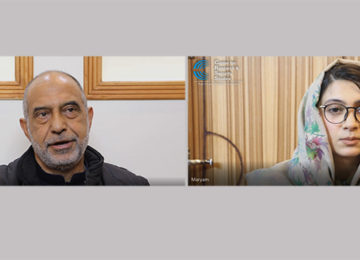January 31, 2018
The Center for Research and Security Studies (CRSS) conducted a workshop on “Understanding the Basic Principles of Human Rights” for young participants from Pakistan and Afghanistan on Monday, January 29, 2018. The workshop was designed as part of CRSS efforts under its Afghan Studies Center (ASC) initiative to bring together young minds from both countries on one platform to interact and exchange ideas from their personal experiences as a way to mitigate the unnecessarily growing mistrust between the two peoples.
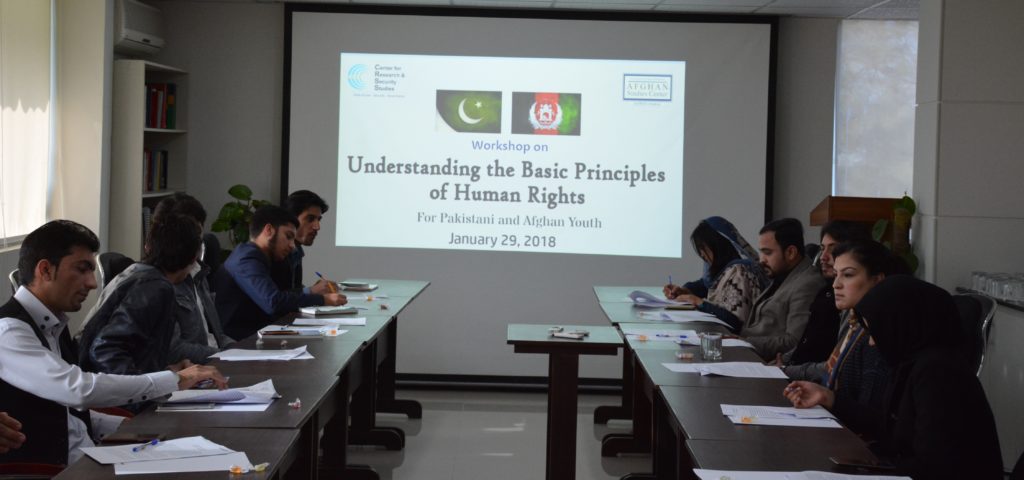
Mr. Amjad Nazeer, a well-known Social and Public Policy Researcher and Analyst heading the Institute of Development Research and Corresponding Capabilities (IDRAC), Islamabad, wasthe chief guest and trainer in the workshop. He is also a trained Development Researcher and Human Rights Advocate while being an active member of various human rights and development networks.
The session began with Mr. Aized Ali, Project Director Beyond Boundaries, at the outset strongly condemning the recent terrorist attacks in Kabul and Jalalabad, and, on behalf of CRSS, paying condolences for the precious lives lost in Afghanistan. The participants were asked to observe a minute of silence and offer “Fatihah” (Islamic prayer/Chapter of the Noble Quran) for the martyred.

Mr. Amjad Nazeer formally started the session by commending CRSS’ efforts in pushing for positive change by touching on such fundamental and critical avenues of thinking for young minds from both countries. Mr. Amjad said that ‘human rights’ has only become a well-known and popular term since the previous century following the 1948 Universal Declaration of Human Rights. The idea of human rights precipitates from the notion that all human beings are born free and equal irrespective of their place of birth, nationality, sex, ethnicity, color, religion, creed, caste, language, or financial status. Hence, every human being, man and woman, is equally entitled to the fulfillment of basic human rights without discrimination. Basic rights include freedom of speech, privacy, health, life, liberty and security, as well as an adequate standard of living and the right to education. States are obliged to legislate, implement, promote and spread awareness about human rights equally for the poor, rich, men or women, children or the elderly, through whatever means available, including electronic and print media. Mr. Amjad further stated that, unlike the practice in Pakistan and Afghanistan, the right to education for a child was not a privilege but a basic human right that every State needs to fulfill.
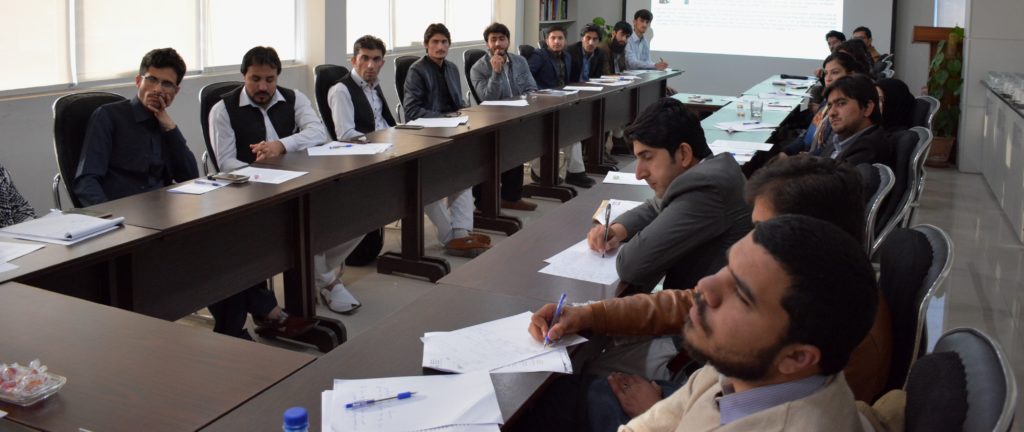
Speaking in the context of Pakistan and Afghanistan, Mr. Amjad stated, unfortunately many in the region continue to remain ignorant of their basic human rights as human beings. Knowing one’s rights allows one to safeguard him/herself against all types of abuse as well as attempt to ensure the protection of other people’s rights. Human rights are universal and every person around the world deserves to be treated with dignity and equality.
Mr. Amjad remarked that there can be little doubt that human rights have become the major ethico-political idea of our age. It has transformed into an ideology and a culture in itself. Yet in spite of such enthusiasm for human rights, and notwithstanding their growing popularity and widespread acceptance today, the idea of human rights also prompts major challenges.
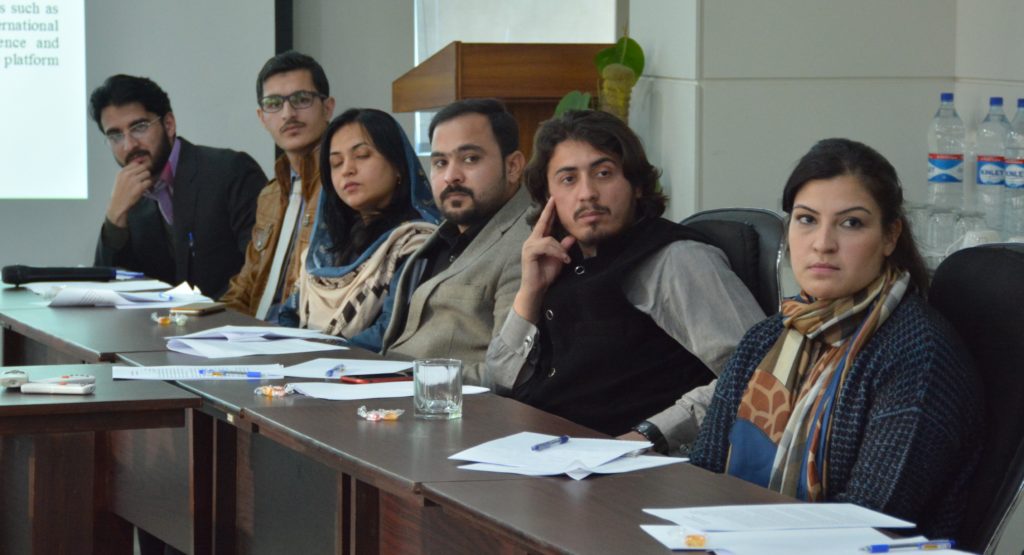
Commenting on the human rights status in Pakistan and Afghanistan, the trainer said that both the countries have very well incorporated the principles of the Universal Declaration of the Human Rights Act 1948 into their constitutions. However, there are implementation issues, where both the countries have to work robustly. Pakistan is overall better in implementation of human rights in general, as it has a mature state machinery and has established various institutions in this regard, whereas, Afghanistan has incorporated the principles of basic human rights in its constitution in 2004, which can be seen as a silver lining in the cloud. Freedom of expression and hate speech are the biggest hurdles to move forward on the subject of human rights in both the countries. Pakistan and Afghanistan both have shown poor performance in this regard, but things are improving and there is some optimism.
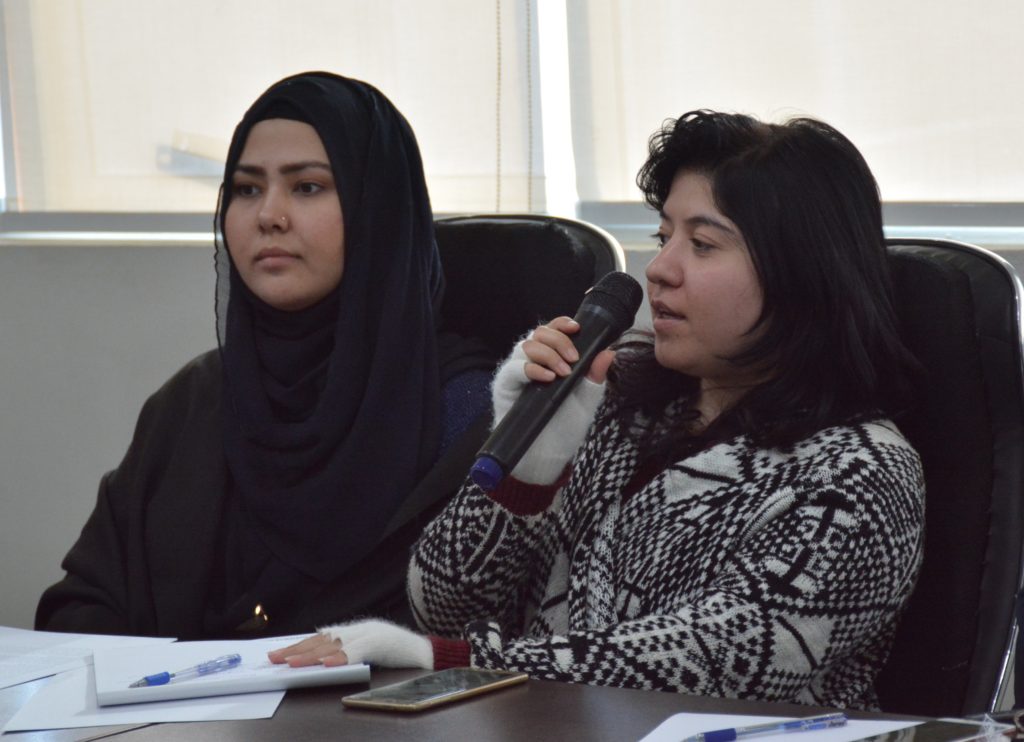
In the discussion session, participants posed several questions regarding the issue of the poor treatment given to refugees, hurdles faced in the Afghan visa regime by Afghan students in particular, as well as the rights of the youth in both countries in general. Certain participants belonging to FATA pointed out the problems of FCR and how it was against human rights while others emphasized on the need for providing a safe and secure environment to not only the refugees but the people in both countries as every individual’s basic right to safety, security and clean environment. Some participants urged that social media as well as the print and electronic media can play a positive and constructive role in promoting human rights in the Af-Pak region. One participant cited the recent horrendous case of the murder of Zainab, a young girl that was killed after being molested, which raised a hue and cry on the social media and urged the general public to put pressure on the government to ensure the provision of human rights in Pakistan.
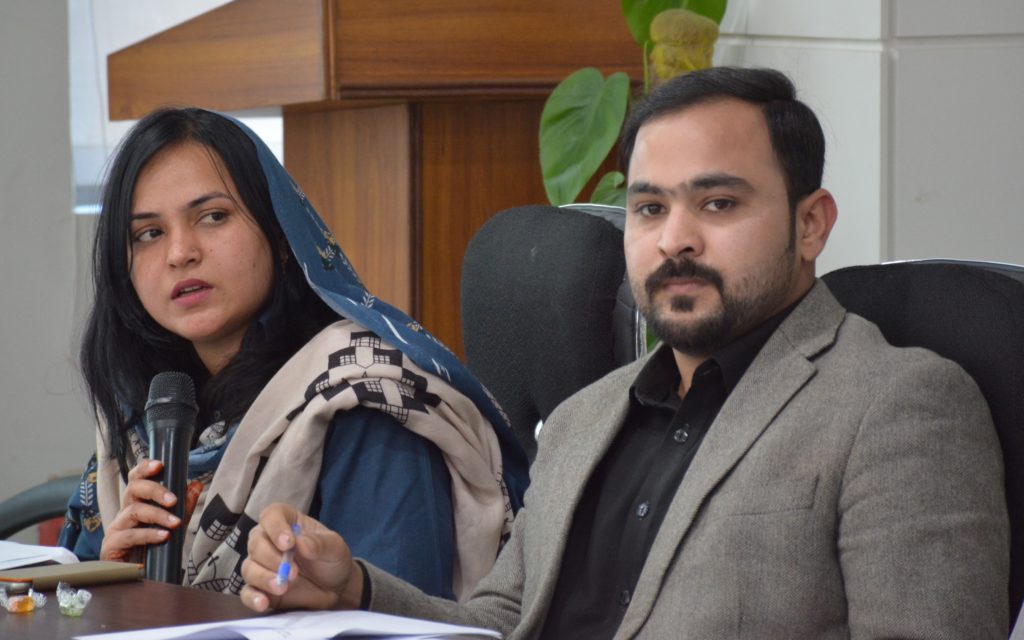
In his concluding remarks, Mr. Amjad stated that every change begins with an idea and imagination. While the progress of moving towards human rights fulfillments has been slow in Pakistan and Afghanistan, Mr. Amjad urged the participants to start bringing change from within themselves. Pakistan and Afghanistan, being Muslim countries, should be more mindful of the fulfillment of human rights in this regard. It was the Muslim leaders of early Islam who gave the fundamental principles of human rights even in a state of war 1400 years ago. Those leaders instructed their soldiers not to harm women, children, elderly, crops etc. they further instructed not to disturb any person worshipping in their respective worship place.
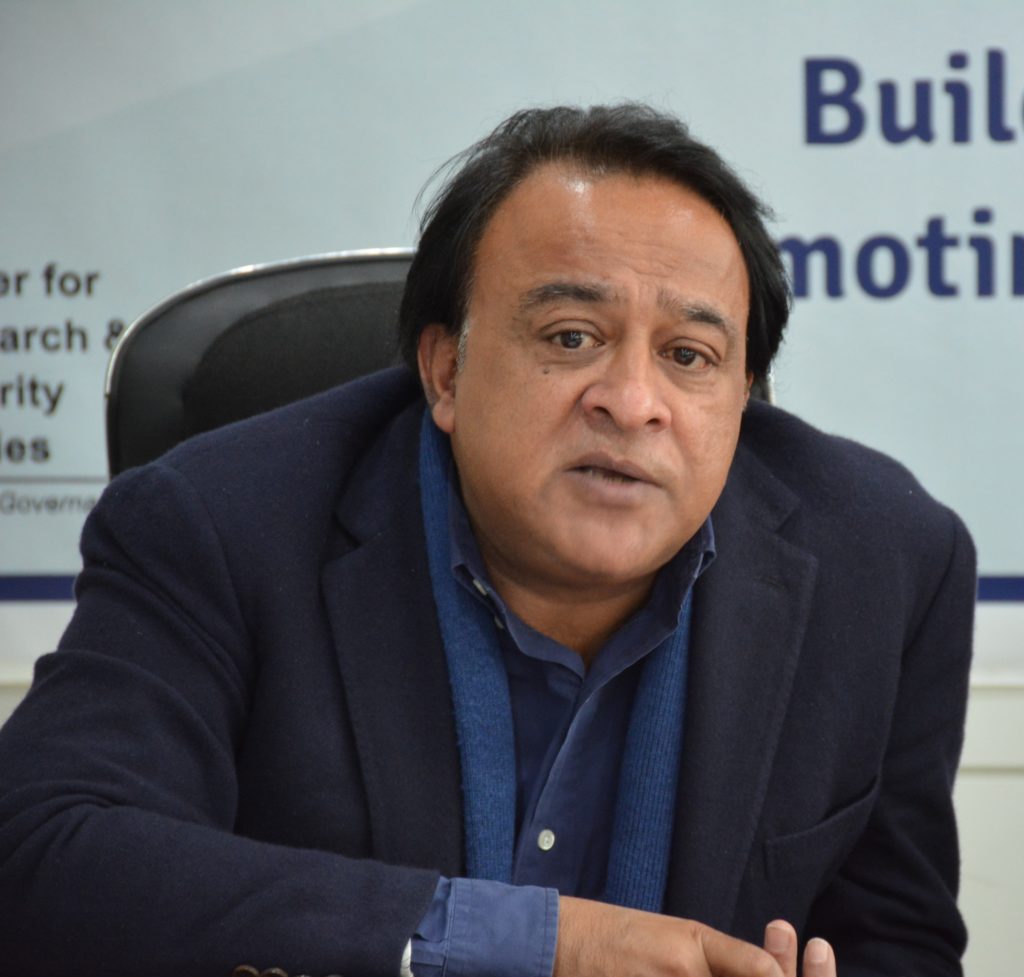
Mr. Aized Ali, Project Director Beyond Boundaries at CRSS, who was moderating the session, apprised the participants on CRSS’ Pak-Afghan Beyond Boundaries Track1.5/II diplomacy initiative which led to the emergence of Afghan Studies Center (ASC). He told the participants that Beyond Boundaries had been a conscious effort to bridge the gulf of mistrust between the two neighbors. He also encouraged the participants to be mindful of human rights in their capacity and ensure that wherever they are studying or working, they should work towards fulfillment of human rights as per the constitution.
The workshop ended with a group photo following refreshments giving the participants from both countries the chance to interact informally with each other.
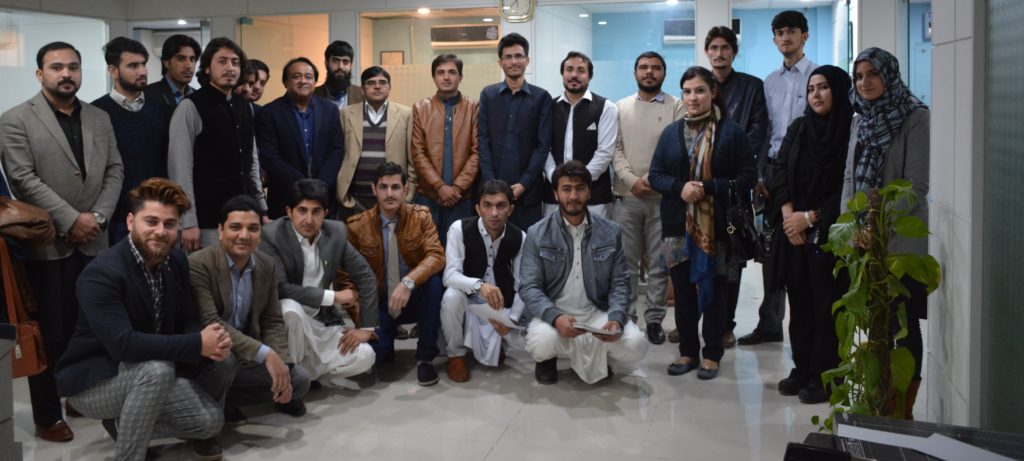
The workshop was the sixth in Afghan Studies Center’s series of scheduled workshops for Afghan and Pakistani youth and was attended by 19 Afghan and Pakistani participants studying in various universities across Pakistan. Through such activities, the center aspires for peace by engaging the youth from both sides in informed discourses, and capacity building through skills development workshops. Alongside such workshops, the center also runs a monthly dialogue series with participation of young men and women from Pakistan and Afghanistan to increase the much needed people to people contact that has been decreasing in recent years.
The Afghan Studies Center is an initiative by the Center for Research and Security Studies, Islamabad – an independent and non-profit think tank and advocacy center. One of the primary objectives of the Afghan Studies Center is to serve as a bridge between the youth of Pakistan and Afghanistan to interact with each other and join hands to become leaders of change and messengers of peace and cooperation beyond boundaries. To achieve this objective, the Afghan Studies Center invites young Afghans to share their story using our platform with the youth of Pakistan as well as the world.
© Center for Research and Security Studies (CRSS) and Afghan Studies Center (ASC), Islamabad.



